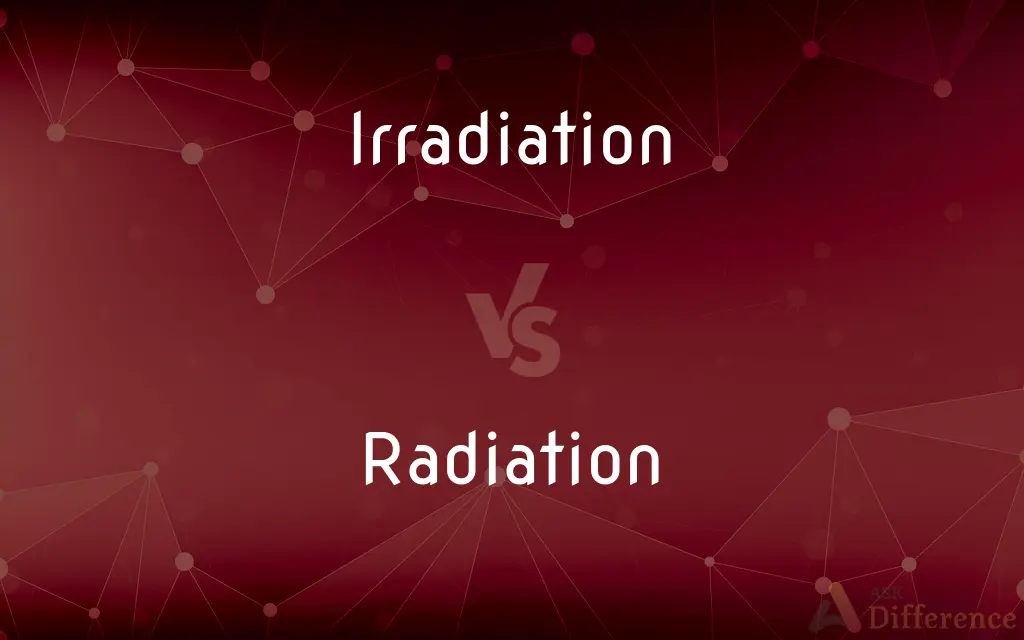Irradiation vs. Radiation — What's the Difference?
By Tayyaba Rehman — Updated on October 23, 2023
Irradiation is the process or act of exposing something to radiation, while radiation is the emission of energy as electromagnetic waves or particles.

Difference Between Irradiation and Radiation
Table of Contents
ADVERTISEMENT
Key Differences
Irradiation and radiation, though related, describe different aspects of the energy emission realm. Irradiation signifies the act or process where an object or a substance is exposed to radiation. Whether it's for sterilization, food preservation, or medical procedures, irradiation intentionally uses radiation to achieve a specific outcome. In contrast, radiation is a broader term, describing the very emission or transmission of energy in the form of waves or particles through space or a medium.
When thinking about medical applications, both irradiation and radiation have distinct roles. For instance, cancerous tumors might undergo irradiation, meaning they're being targeted by radiation for therapeutic purposes. Here, radiation is the tool, and irradiation is the act of using this tool to treat the disease.
The food industry employs the term irradiation frequently. Foods undergoing irradiation are exposed to radiation to kill bacteria and other pathogens, thereby extending shelf life. In this scenario, radiation – whether it's from gamma rays, X-rays, or electron beams – serves as the means, while irradiation is the process that the food undergoes.
In the realm of physics, radiation can be categorized as ionizing or non-ionizing, based on the energy it carries. Ionizing radiation has enough energy to remove tightly bound electrons from atoms, leading to the creation of ions. On the other hand, when materials or instruments are exposed to any kind of radiation, they undergo irradiation.
It's crucial to understand that while all irradiation involves radiation, not all radiation is used for irradiation. Radiation is a natural phenomenon; it's everywhere around us, from the sunlight that warms our planet to the radio waves that carry music to our radios. But irradiation is a deliberate act, using radiation purposefully for specific applications.
ADVERTISEMENT
Comparison Chart
Definition
The act or process of exposing to radiation.
Emission of energy as waves or particles.
Usage
Deliberate application.
Natural or man-made occurrence.
Examples
Food preservation, medical treatment.
Sunlight, radio waves, gamma rays.
Relation
A process or act.
The emitted energy itself.
Involvement
Always involves radiation.
Does not necessarily involve irradiation.
Compare with Definitions
Irradiation
The process of illuminating something with light.
The plant's growth was influenced by the irradiation from the lamp.
Radiation
The emission of energy as electromagnetic waves or as moving subatomic particles.
The sun emits radiation in the form of light and heat.
Irradiation
The application of radiation to a material to alter its properties.
Diamonds can change colors after irradiation.
Radiation
Energy transmitted through space in the form of waves or particles.
Ultraviolet radiation can harm our skin.
Irradiation
Irradiation is the process by which an object is exposed to radiation. The exposure can originate from various sources, including natural sources.
Radiation
The process of emitting energy in the form of waves or particles.
Nuclear reactions result in the radiation of energy.
Irradiation
The act of exposing or the condition of being exposed to radiation.
Radiation
Waves or particles (like alpha, beta, gamma) given off by unstable atoms.
Radioactive materials produce harmful radiation.
Irradiation
The use or application of ionizing radiation, especially in medical treatment and for the sterilization or preservation of food.
Radiation
Ionizing or non-ionizing energy emitted from a source.
X-rays are a form of ionizing radiation.
Irradiation
An act of irradiating, or state of being irradiated.
Radiation
In physics, radiation is the emission or transmission of energy in the form of waves or particles through space or through a material medium. This includes: electromagnetic radiation, such as radio waves, microwaves, infrared, visible light, ultraviolet, x-rays, and gamma radiation (γ) particle radiation, such as alpha radiation (α), beta radiation (β), proton radiation and neutron radiation (particles of non-zero rest energy) acoustic radiation, such as ultrasound, sound, and seismic waves (dependent on a physical transmission medium) gravitational radiation, radiation that takes the form of gravitational waves, or ripples in the curvature of spacetimeRadiation is often categorized as either ionizing or non-ionizing depending on the energy of the radiated particles.
Irradiation
(obsolete) illumination; irradiance; brilliance.
Radiation
The act or process of radiating
The radiation of heat and light from a fire.
Irradiation
Mental light or illumination.
Radiation
Emission or propagation of energy in the form of waves or particles.
Irradiation
(obsolete) The apparent enlargement of a bright object seen upon a dark ground, due to the fact that the portions of the retina around the image are stimulated by the intense light; as when a dark spot on a white ground appears smaller, or a white spot on a dark ground larger, than it really is, especially when a little out of focus.
Radiation
Energy radiated or transmitted in the form of waves or particles.
Irradiation
(uncountable) a process of sterilization whereby radiation is passed through a bag containing food, utensils, etc., to sterilize the contents. Category:en:Radioactivity
Radiation
A stream of particles or electromagnetic waves emitted by the atoms and molecules of a radioactive substance as a result of nuclear decay.
Irradiation
Act of irradiating, or state of being irradiated; as, irradiation of foods with X-rays can preserve their freshness by killing the bacteria that cause spoilage .
Radiation
The act of exposing or the condition of being exposed to such energy.
Irradiation
Illumination; irradiance; brilliancy.
Radiation
The application of such energy, as in medical treatment.
Irradiation
Fig.: Mental light or illumination.
Radiation
(Anatomy) Radial arrangement of parts, as of a group of nerve fibers connecting different areas of the brain.
Irradiation
The apparent enlargement of a bright object seen upon a dark ground, due to the fact that the portions of the retina around the image are stimulated by the intense light; as when a dark spot on a white ground appears smaller, or a white spot on a dark ground larger, than it really is, esp. when a little out of focus.
Radiation
Adaptive radiation
Irradiation
The condition of being exposed to radiation
Radiation
The shooting forth of anything from a point or surface, like diverging rays of light.
Heat radiation
Irradiation
A column of light (as from a beacon)
Radiation
The process of radiating waves or particles.
Irradiation
(physiology) the spread of sensory neural impulses in the cortex
Radiation
The transfer of energy via radiation.
Irradiation
The apparent enlargement of a bright object when viewed against a dark background
Radiation
Radioactive energy.
Irradiation
(Pavolvian conditioning) the elicitation of a conditioned response by stimulation similar but not identical to the original stimulus
Radiation
A rapid diversification of an ancestral species into many new forms.
Irradiation
(medicine) the treatment of disease (especially cancer) by exposure to radiation from a radioactive substance
Radiation
The act of radiating, or the state of being radiated; emission and diffusion of rays of light; beamy brightness.
Irradiation
The exposure of an object or substance to radiation.
The food underwent irradiation to kill harmful bacteria.
Radiation
The shooting forth of anything from a point or surface, like the diverging rays of light; as, the radiation of heat.
Irradiation
The use of radiation for therapeutic purposes, especially in medicine.
The tumor was treated with irradiation.
Radiation
Energy that is radiated or transmitted in the form of rays or waves or particles
Irradiation
A method used to preserve food by reducing or eliminating microorganisms and insects.
Irradiation helps extend the shelf life of certain fruits.
Radiation
The act of spreading outward from a central source
Radiation
Syndrome resulting from exposure to ionizing radiation (e.g., exposure to radioactive chemicals or to nuclear explosions); low doses cause diarrhea and nausea and vomiting and sometimes loss of hair; greater exposure can cause sterility and cataracts and some forms of cancer and other diseases; severe exposure can cause death within hours;
He was suffering from radiation
Radiation
The spontaneous emission of a stream of particles or electromagnetic rays in nuclear decay
Radiation
The spread of a group of organisms into new habitats
Radiation
A radial arrangement of nerve fibers connecting different parts of the brain
Radiation
(medicine) the treatment of disease (especially cancer) by exposure to radiation from a radioactive substance
Common Curiosities
Does all radiation pose a health risk?
Only ionizing radiation, like X-rays, poses significant health risks at high levels.
Is sunlight a form of radiation?
Yes, sunlight is a form of electromagnetic radiation.
Why is irradiation used in cancer treatment?
Irradiation targets and kills cancer cells, slowing or stopping tumor growth.
What does it mean for food to be irradiated?
It means the food has been exposed to radiation to kill bacteria and extend its shelf life.
Are mobile phones a source of radiation?
Yes, they emit non-ionizing radiation, but at levels considered safe for regular use.
Can irradiation make food radioactive?
No, the process of irradiation does not make food radioactive.
Is the irradiation of food safe for consumption?
Yes, irradiated food is considered safe and retains its nutritional value.
How is radiation measured?
Radiation is often measured in units like rads, rems, sieverts, or grays.
What are the most common sources of radiation in daily life?
Common sources include sunlight, radon, and certain household appliances.
What is the purpose of irradiation in food?
Irradiation in food kills pathogens and extends shelf life.
Does irradiation change the taste of food?
Generally, irradiation has minimal to no effect on the taste of food.
How does irradiation help in sterilization?
Irradiation damages the DNA of microorganisms, rendering them inactive or dead.
Why is radiation used in smoke detectors?
A small amount of radioactive material helps detect smoke particles in the air.
Does the human body emit radiation?
Yes, due to naturally occurring radioactive atoms in our body, we emit a small amount of radiation.
Is radiation therapy the same as irradiation?
Radiation therapy is a type of irradiation used to treat diseases like cancer.
Share Your Discovery

Previous Comparison
Duchess vs. Princess
Next Comparison
Oft vs. LoftAuthor Spotlight
Written by
Tayyaba RehmanTayyaba Rehman is a distinguished writer, currently serving as a primary contributor to askdifference.com. As a researcher in semantics and etymology, Tayyaba's passion for the complexity of languages and their distinctions has found a perfect home on the platform. Tayyaba delves into the intricacies of language, distinguishing between commonly confused words and phrases, thereby providing clarity for readers worldwide.














































